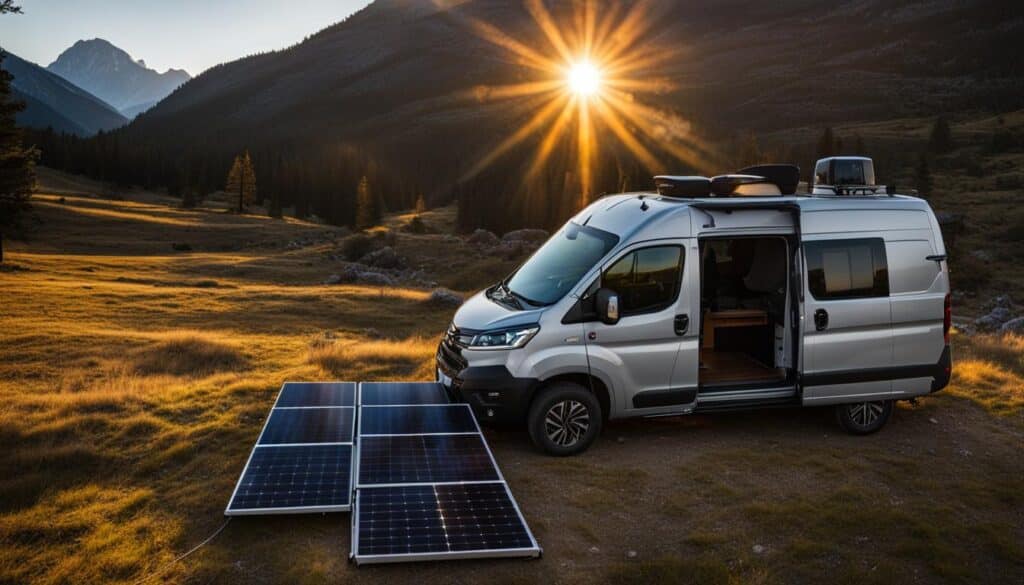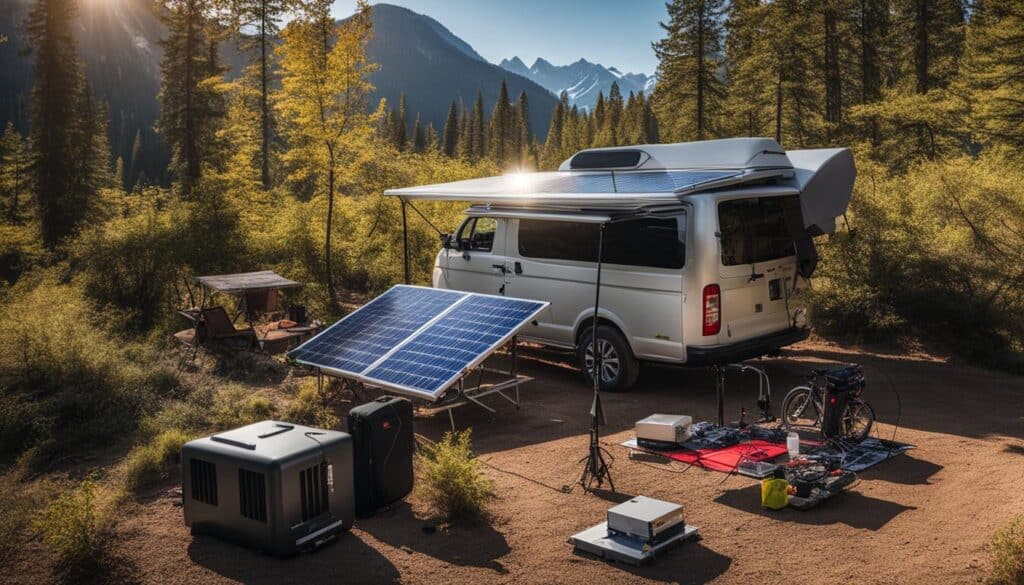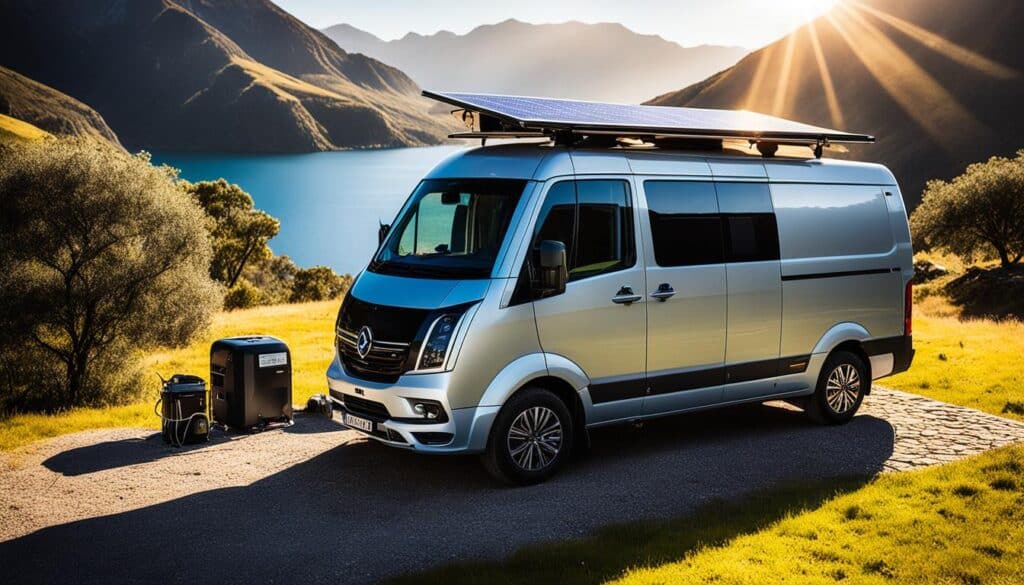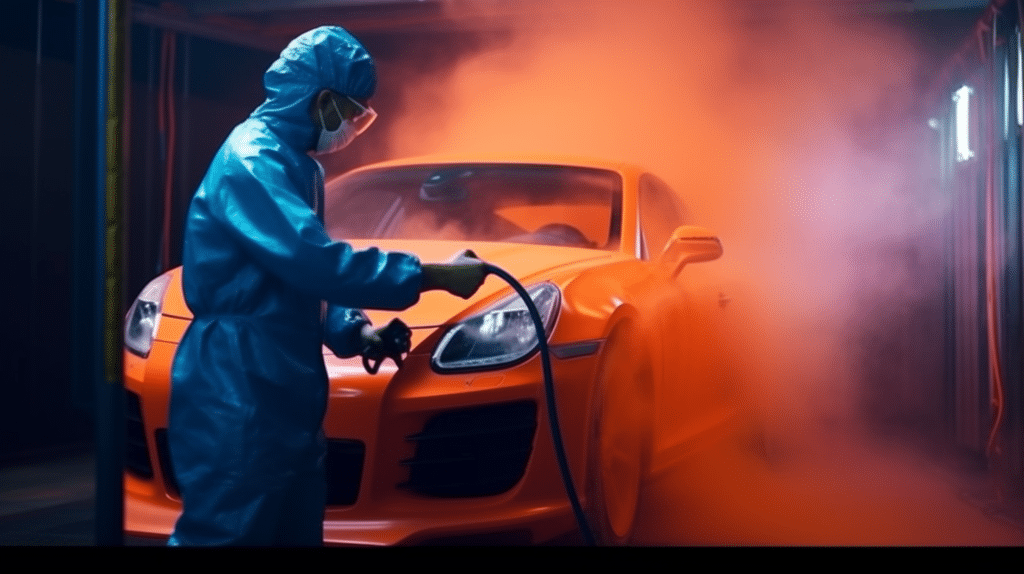Determining the amount of solar power needed for a camper van is crucial for staying powered up off-grid. Solar panels collect energy from the sun and recharge the batteries in the camper van’s electrical system. The number of solar panels does not matter; it is the total wattage of the solar panel array that is important. To determine the wattage of solar panels needed, the usable amp hours of the batteries should be considered. A general guideline is to have 200 watts of solar panels per 100 amp hours of usable battery capacity. However, having more solar panels can charge the battery faster and compensate for cloudy days.
Key Takeaways:
- Calculating the wattage of solar panels is more important than the number of panels for a camper van.
- Consider the usable amp hours of the batteries to determine the wattage needed.
- Having more solar panels can help charge the battery faster and provide backup power during cloudy days.
- It is recommended to have 200 watts of solar panels per 100 amp hours of usable battery capacity.
- Opt for a solar power set-up that suits your energy requirements and available roof space.
How Many Solar Panels Do You Need?
When determining the solar power setup for your camper van, it’s essential to consider the size and number of solar panels required. Solar panels are measured in watts, which refers to the amount of power they can produce. The total wattage of the solar panel array, determined by multiplying the wattage of each panel by the number of panels, is what matters for your camper van’s energy needs.
To estimate the appropriate solar panel size for your camper van, you can use a solar power calculator designed specifically for this purpose. These calculators take into account factors such as your battery capacity and expected energy consumption. One popular calculator is the “Solar Power Calculator for Camper Van,” which provides accurate estimates based on your specific requirements.
A general guideline is to have approximately 200 watts of solar panels for every 100 amp hours of usable battery capacity. However, this guideline can be adjusted based on your individual energy requirements and the available roof space for panel installation. Keep in mind that having more solar panels can help compensate for cloudy days and may provide faster battery charging.
It’s also important to consider wiring your solar panels in series for optimal performance. Wiring in series connects the positive terminal of one panel to the negative terminal of the next, creating a higher voltage output. This wiring configuration can improve efficiency and reduce power loss.
Example Calculation:
| Solar Panel Size (Watts) | Number of Panels | Total Wattage |
|---|---|---|
| 200 | 4 | 800 |
“I used the Solar Power Calculator for my camper van and found that I needed approximately 800 watts of solar panels distributed across four panels. This setup perfectly meets my energy requirements and gives me peace of mind while traveling off-grid.” – Emily, Camper Van Enthusiast
By accurately determining the solar panel size and quantity, you can be confident that you have enough power to support your camper van’s electrical system. This ensures a reliable and sustainable energy source, allowing you to enjoy your adventures without worrying about running out of power.
Solar Panels for RV Living
Adding a solar energy system to an RV or camper van is crucial for maximizing the freedom of living off-grid. With the installation of solar panels, you can harness the power of the sun to generate electricity for your appliances, lights, and sockets in the RV. This not only reduces your dependence on traditional power sources but also helps to minimize your carbon footprint.
The number of solar panels needed for your RV depends on the size of the vehicle and the power consumption of the appliances on board. For larger RVs with a higher number of appliances, it is recommended to have at least four 200-watt solar panels to ensure sufficient power supply. On the other hand, smaller camper vans with modest energy requirements may be satisfied with a single 200-watt panel.
The total cost of the solar system will vary based on the type of panels chosen and the amount of electricity needed to power your RV.

When considering the installation of solar panels for your camper van, it is important to take into account the camper van electrical system. It is advisable to consult with a professional to ensure proper installation and integration of the solar panels with the existing electrical system.
By investing in a camper van solar power kit, you can enjoy the convenience of sustainable energy while on the road.
Determining Your Solar Energy Needs
To accurately determine the solar energy needs for your camper van, careful calculations need to be made. Several factors come into play when determining the appropriate solar power setup for your vehicle. These include your energy consumption habits, the efficiency of the solar panels, and the amount of sunlight received each day. It’s essential to consider all these factors to ensure you have enough power to meet your needs while living off-grid.
One of the crucial considerations when calculating your solar energy needs is the power consumption of appliances in your camper van. Fridges, for example, often consume a significant amount of power. It’s essential to account for their energy consumption when determining the size and capacity of your solar power system.
While 200 watts of solar energy capture may be sufficient for minimal power requirements, it’s recommended to have additional solar panels or extra batteries for backup power. This will provide you with a reliable power source even in situations with reduced sunlight or increased energy demands. Modular power kits and portable solar generators are popular options among camper van owners, offering flexibility and convenience.
“Determining your solar energy needs requires careful calculations, considering your energy consumption habits, efficiency of solar panels, and amount of sunlight received. Having backup power options such as extra batteries or portable solar generators is advisable for uninterrupted power supply.”
Finding the Right Solar Power Kit
When it comes to choosing a solar power system for your camper van, a variety of kits are available on the market. These kits are designed to meet different energy requirements and accommodate various camper van sizes. Before investing in a solar power kit, it’s crucial to evaluate your energy needs and select a kit that suits your requirements.
Here is a comparison table of popular camper van solar power kits:
| Solar Power Kit | Wattage | Battery Capacity |
|---|---|---|
| Kit A | 300W | 100Ah |
| Kit B | 400W | 200Ah |
| Kit C | 600W | 300Ah |
These kits serve as a starting point for choosing the right solar power system for your camper van. Consider your power requirements, the available space for installation, and your budget when making a decision. It’s recommended to consult with a professional installer or review user reviews and experiences to ensure you select a kit that suits your specific needs.
With the right solar power system in place, you can enjoy the freedom of off-grid living while ensuring a reliable and sustainable power supply for your camper van.
Permanent vs. Portable Solar Power Setup
When it comes to setting up a solar power system for your camper van, you have the choice between a permanent or portable setup. Each option has its own advantages and considerations.
Permanent Solar Power Setup
If you opt for a permanent setup, you will install solar panels securely on the roof of your camper van. This type of setup offers the advantage of producing more energy, as the panels have a fixed position for maximum exposure to sunlight. However, it’s important to consider that a permanent installation takes up space on the roof and may limit your parking options.
Portable Solar Power Setup
Alternatively, you can choose a portable solar power setup for your camper van. Portable solar panels provide flexibility in placement, allowing you to adjust the position of the panels based on the sun’s direction. This makes them ideal for RV owners who frequently change locations or want the freedom to explore off-grid areas. Portable solar panels can also be easily carried on hikes or camping trips, ensuring you always have a reliable power source.
“Whether you choose a permanent or portable setup, solar power for your camper van gives you the freedom to explore off-grid locations and enjoy a sustainable power source.”
In addition to portable solar panels, you can also consider using portable solar generators for a more lightweight and compact power solution. These generators are easy to transport and store, making them a convenient option for camper van owners.
The choice between permanent and portable setups depends on your individual preferences and power requirements. If you prioritize maximum energy production and are willing to sacrifice some roof space, a permanent setup may be the best option for you. On the other hand, if flexibility and portability are important to you, a portable setup offers convenience and the ability to adapt to different situations.
Whatever option you choose, incorporating solar power into your camper van’s electrical system can provide you with a reliable and sustainable source of energy, allowing you to enjoy off-grid adventures with ease.

Conclusion
When it comes to solar power for your camper van, determining the right amount is key to ensuring uninterrupted off-grid adventures. By calculating the total wattage of your solar panel array based on the usable amp hours of your batteries, you can have a reliable camper van solar system tailored to your needs. As a general guideline, it is recommended to have 200 watts of solar panels per 100 amp hours of usable battery capacity.
However, it’s essential to consider your individual energy requirements and the available roof space for installation. Whether you opt for a permanent setup with securely installed solar panels or a portable setup that offers flexibility, solar power is a convenient and eco-friendly alternative for RV owners. It gives you the freedom to live off-grid while enjoying accessible electricity for your camper van.
So, whether you’re embarking on cross-country road trips or camping in remote locations, harnessing solar power in your camper van is a sustainable choice that allows you to stay connected to the world while embracing the beauty of nature.
FAQ
How much solar power do I need for my camper van?
The amount of solar power needed for your camper van depends on the usable amp hours of the batteries. A general guideline is to have 200 watts of solar panels per 100 amp hours of usable battery capacity. However, this can be adjusted based on your individual energy requirements and available roof space for installation.
How do I determine the size of solar panels for my camper van?
The size of the solar panel array for your camper van is determined by the total wattage of the solar panels. To determine the wattage needed, consider the usable amp hours of the batteries. A general guideline is to have 200 watts of solar panels per 100 amp hours of usable battery capacity. This can be adjusted based on your individual energy requirements and available roof space for installation.
What is the difference between solar panels for camper vans and RVs?
Solar panels for camper vans and RVs function in the same way, collecting energy from the sun and converting it into usable electricity. The main difference is the number of panels needed, which depends on the size of the vehicle and the power consumption of the appliances on board. Larger RVs may require more solar panels compared to smaller camper vans.
How do I determine my solar energy needs for my camper van?
To determine your solar energy needs for your camper van, consider factors such as your energy consumption habits, the efficiency of the solar panels, and the amount of sunlight received each day. It is also important to account for power-hungry appliances like fridges. While 200 watts of solar energy capture may be enough for minimal power requirements, having more solar panels or extra batteries for backup power is recommended.
Should I choose a permanent or portable solar power setup for my camper van?
The choice between a permanent or portable solar power setup for your camper van depends on your individual preferences and power requirements. A permanent setup involves installing solar panels securely on the roof, providing more energy but limiting parking options. Portable solar panels offer flexibility in placement and are ideal for those who frequently change locations. Portable solar generators are also available for a lightweight and compact power solution.




